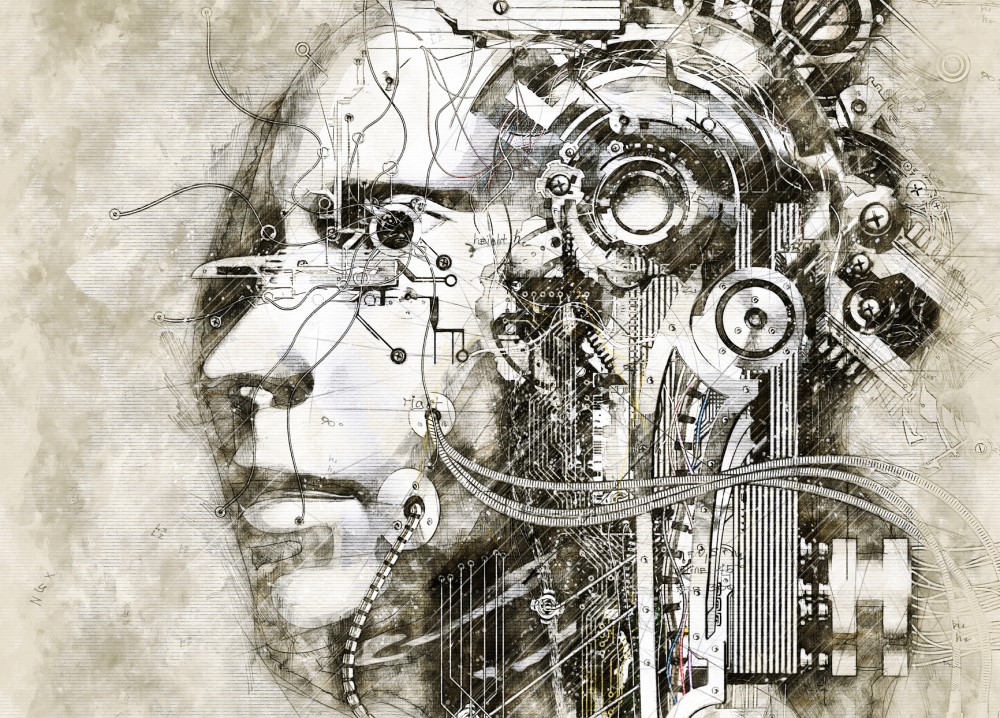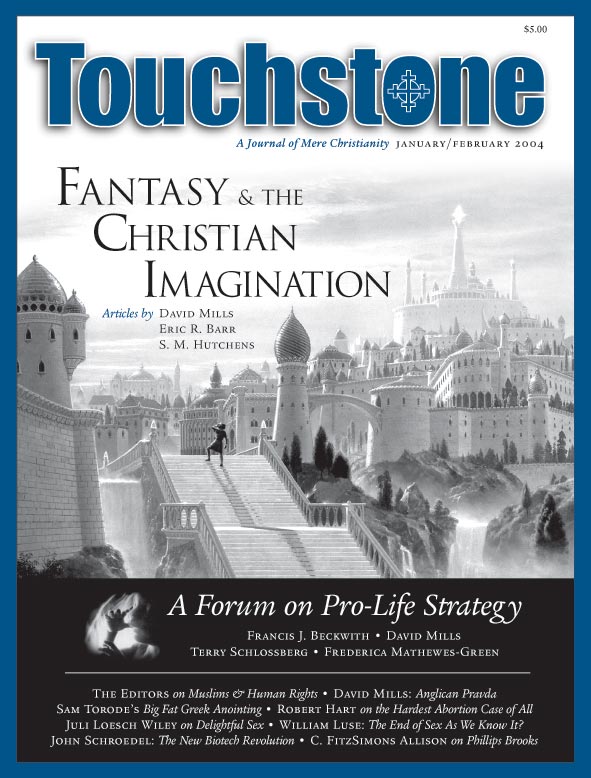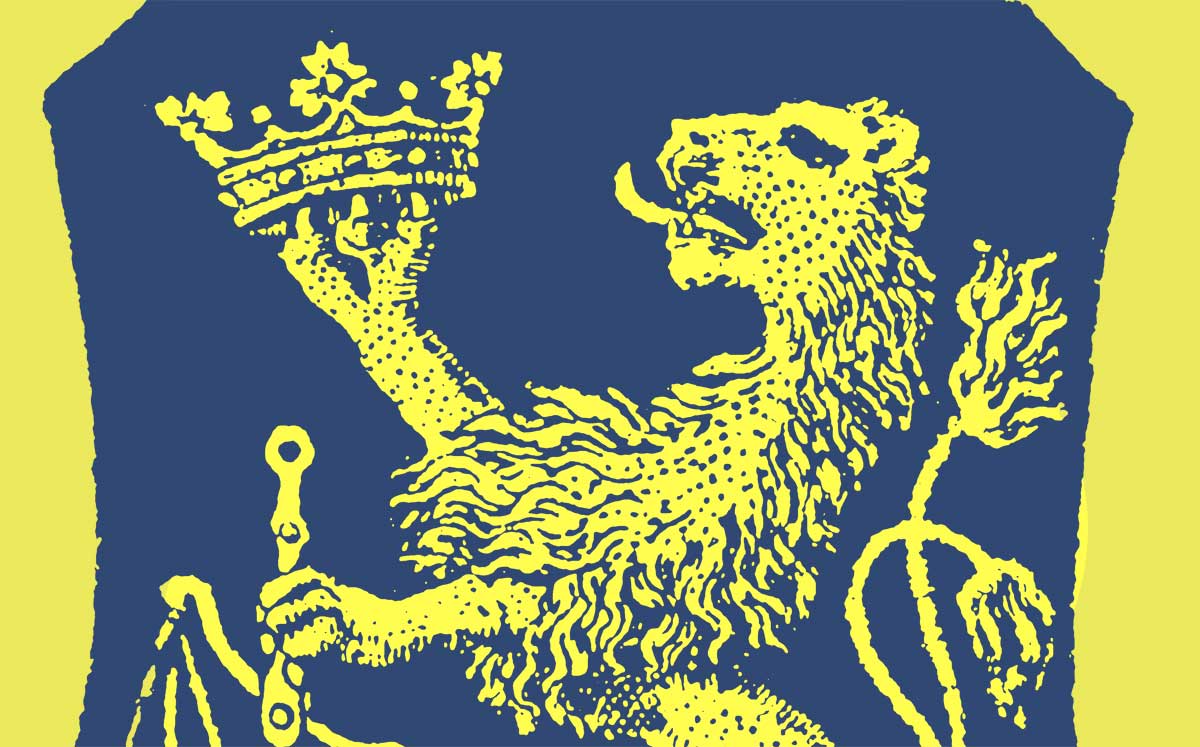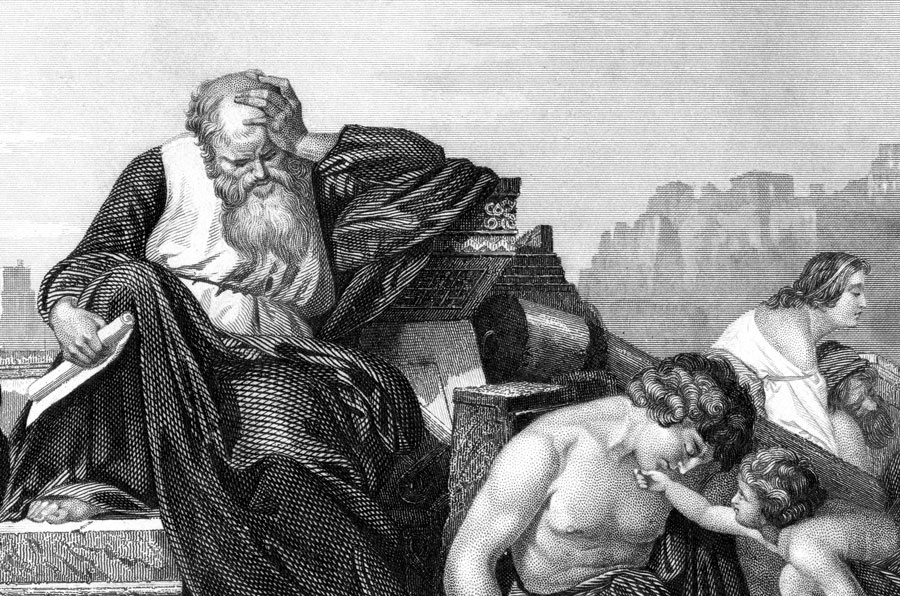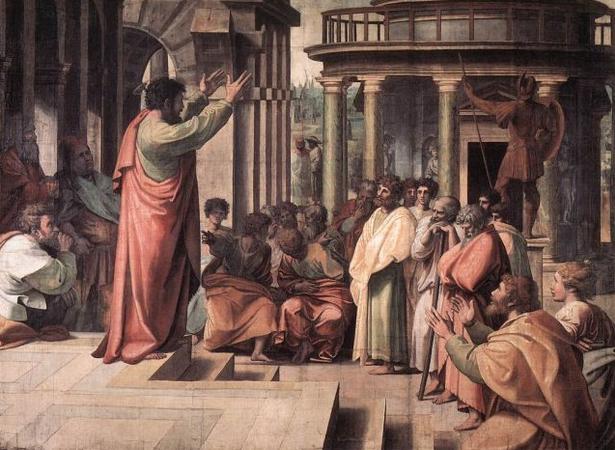Feature
Great Escapes & Lesser Stories
The Alternative Worlds of C. S. Lewis, Aldous Huxley & George
Orwell
In his recent book J. R. R. Tolkien, Tom Shippey attacked the idea, held by a wide range of the major writers and critics of our day—by the word major I am not implying any trust in their judgment, by the way, just describing their status—that The Lord of the Rings is escapist fiction suited only for introverted acne-covered adolescents of mediocre intelligence and deficient social skills. He pointed out that the most influential books of the twentieth century have also been a kind of fantasy.
He mentioned the famous “dystopian” novels, including George Orwell’s 1984 and Animal Farm, Aldous Huxley’s Brave New World, William Golding’s The Lord of the Flies, and several others.1 Dismiss The Lord of the Rings because it is a fantasy, he argued, and you dismiss these as well.
In his famous essay, “On Fairy-Stories,” Tolkien argued that these stories offered “Escape,” which he wrote with a capital E, but that the mainstream critics scorn the idea. In what they call “Real Life,”
Escape is evidently as a rule very practical, and may even be heroic. . . . Why should a man be scorned if, finding himself in prison, he tries to get out and go home? Or if, when he cannot do so, he thinks and talks about other topics than jailers and prison-walls? The world outside has not become less real because the prisoner cannot see it.2
These critics confuse Escape with “Desertion” and “stick their label of scorn not only on to Desertion, but on to real Escape, and what are often its companions, Disgust, Anger, Condemnation, and Revolt.” These companions we recognize as the acts not of an “escapist” but of a social critic, even a prophet, and they would be recognized as such by a thoughtful man of the left or the right. Tolkien went on to explain how, by creating an alternative world, fairy stories can criticize modern life and advance things (a reconciliation with nature, for example) that modern men have lost or rejected.
The Great Story
To put this in terms of the Great Story God has told, fairy stories or fantasy literature can offer such criticism and such defense because they offer a truer picture of the Great Story than the pictures most political stories offer. The politicized stories are very often distorted. Fantasy as Tolkien understands it is not escapist in the critics’ sense of the word. It is deeply subversive of ideologies that tell stories that distort or deny the Great Story.
This is obviously true of The Lord of the Rings. Because it is so deeply a Christian work, The Lord of the Rings will offend any secular man of the left or the right, and offend Christians whose political views have been to any extent secularized. Tolkien has been called a “tree hugger,” and his concern for ecology has made him a hero to the environmentalist left and a villain to the free-market right who think such interest in the natural world for its own sake naïve, impractical, and unworldly.
But for him, the natural ecology would—had he known the word in its new sense—have included the ecology of the human body and specifically the ecology of the divine creation of man as male and female, with different purposes, natures, minds, and ends. This makes him a villain to the environmentalist left and a hero to the traditionalist right.
Adapting Tolkien’s terms, I want to call political fantasies like 1984 or Brave New World the “literature of deliverance.” At their best, such books deliver man from his illusions because they say, with imaginative force and insight, that this is the way the world really is, whatever it looks like at the moment and whatever one’s ideology says it looks like. The literature of deliverance reveals something of the Great Story that has been hidden from sight by the dominance of the particular society’s false stories.
1984, Brave New World, and C. S. Lewis’s That Hideous Strength (a book Shippey does not include in his list, though he should have done so) offer alternative stories intended to subvert and deliver men from certain dominant false stories and to a lesser extent to tell men what their authors believe is the true story. Although 1984 and Brave New World are better-written books, That Hideous Strength is a deeper and wiser book—which is to say, more adequate to the Great Story—because it includes both a more realistic understanding of that from which man needs to be delivered and a more plausible vision of deliverance.
While the first two may more penetratingly analyze the dynamics of totalitarianism, Lewis better understood its causes and sole cure. I think we can judge such works by the extent to which their author realizes that his characters live not only in a social and political prison but in a spiritual prison as well, and that political deliverance without spiritual deliverance does not bring true and lasting freedom, even in this world alone.
I want to use these three political fantasies, especially 1984 and That Hideous Strength, to find out if a work in “the literature of deliverance” can succeed as a story if it does not express the Great Story. I am assuming most readers have either read 1984 and Brave New World or have picked up the general idea. I suspect fewer have read That Hideous Strength, which seems to be the least read of all Lewis’s fiction, with the possible exception of The Pilgrim’s Regress.
Huxley & Lewis
Aldous Huxley’s Brave New World was published in 1932 (in 1958 he published a reflection on the book titled Brave New World Revisited).3 Huxley, the son of one of England’s great secular families—his uncle T. H. Huxley had been known as “Darwin’s Bulldog” and had been the chief propagandist for Darwinism in the late nineteenth century—more or less disregarded Christianity.
The book describes a world in which people are first created in “hatcheries” for specific purposes—the world is rigidly divided into classes, from the almost perfect Alphas to the moronic Epsilons—and then conditioned in nurseries to fulfill them. The world is designed to keep people happy by making them love their place in the world and by giving them diversions and pleasures, not least sexual.
After a devastating war, it had been decided (by whom is never made clear) that people wanted order and happiness more than freedom and truth. The upper classes are completely promiscuous, and the few that are hatched fertile carry contraceptives on their belts when they go out for the evening. Everyone has access to a drug called “Soma” that makes him happy and content. A critical view is introduced into the novel by the Savage, a young man who was raised in an Indian reservation in the American southwest, where he had found and memorized a collection of Shakespeare, and brought to England. He is the spokesman for classical Western culture, and he eventually kills himself.4
That Hideous Strength, published in 1945, is both the third book in Lewis’s “space trilogy” (following Out of the Silent Planet and Perelandra) and the “novelization” of his book The Abolition of Man.5 It begins with two young scholars, married only a few months, Mark and Jane Studdock. She wants to be independent and he wants to be in the inner ring of his college. She is having strange and disturbing dreams, which turn out to be visions of things really happening.
As it turns out, a battle is beginning between the N.I.C.E. (the National Institute of Coordinated Experiments), which claims to want only to use science efficiently for the greatest good, but is in fact a demonic attack on man, and a small community at a place called St. Anne’s, under the leadership of a man named Ransom, who is the servant of angels. The N.I.C.E. is often called “Belbury,” after the name of its headquarters. Mark is seduced into joining Belbury, and after a short struggle Jane joins St. Anne’s, though Belbury wants her for her visions. Belbury is eventually destroyed, essentially by divine intervention, and Mark and Jane changed (redeemed, even) and reunited.
As a novel, That Hideous Strength is rather a grab bag. Lewis seems to have chucked in almost every subject he wanted to comment on. In it he deals not only with his usual subjects, God and man, but also with marriage, sex, and the differences between men and women; academic politics; ideological language; the nature of modernizers and reformers, not least their hatred for precedent and tradition and the past in general; the industrial versus the pastoral ideals; the importance and beauty of order and tradition; and the nature of the spiritual struggle, particularly the need to subordinate the ego in submission to God.6
Orwell’s Fantasy
1984 was written in 1948 (hence the title). Orwell had read Brave New World before he wrote 1984 and thought Huxley’s view naïve, even optimistic, because it left out man’s taste for power and his desire to wield it over others. 1984 is set in a dull, dreary, impoverished totalitarian country, run by the Party, which is led by someone called “Big Brother” and always at war with one or the other of the world’s other states. The members of the inner and outer Parties live under the control of Big Brother, while the “proles” live a sort of free life, which is however a bestial one.
The state can watch a member’s every move, and “Thoughtcrime” will inevitably be detected and punished. The state claims the authority, and has the power, to convince the members of the Party that whatever it says is true is true, even that two plus two equals five, which the members accept by practicing “Doublethink.” The main character, Winston Smith, is a talented propagandist, who works in the Ministry of Truth, where his job is to lie by adjusting old news to fit the new political realities.
For reasons we are not given, he begins to rebel against the Party, which he does first by buying an old diary and beginning to write in it. He eventually meets and has an affair with Julia, whose form of rebellion is to have affairs. They set up a sort of home in a room above a junk dealer in one of the prole neighborhoods. They hate the Party, Big Brother, and the state, and after a few months they are, as they expect, caught and tortured into submission.
In the infamous Room 101 they are both finally broken into betraying each other, by being faced with the thing they most feared, and later, when they have been freed and accidentally meet, want nothing to do with each other. The book ends with Winston drinking himself into a stupor in a café, awaiting the time when the Party will finally kill him, and with the famous line, “He loved Big Brother.”
Orwell hated Christianity, and particularly hated the Catholic Church. He once described a crucifix with a stiletto inside as the “perfect symbol” for Christianity, and wrote in the same vein almost every time he wrote on the subject. He believed Christians to be bound by a “smelly little orthodoxy,” an ideology he often compared with Stalinism.7 (Interestingly, his first published article appeared in the late twenties in the little magazine edited by G. K. Chesterton.)
He knew, however, that the loss of Christian faith had hurt his society and that none of the replacements offered had yet worked very well, and he reflected deeply on what this meant. I wonder how close he was to the Kingdom. A man so committed to truth, not just in theory but in a practice that cost him dearly, is a man in some way close to the Truth himself. We have the example of St. Peter to show that a man who denies the Lord may yet follow him, and the example of the rich young ruler to show that a man who listens to him with great interest may yet deny him.
Their Thoughts on Sex
I want to say something about the three writers’ views of the relation of men and women. “What do the authors think of sex?” is a useful question to ask of such books. We often see sexual disorder accepted as natural, and even as an ideal, by authors who honestly want to present a properly ordered society and a true hero.
We live in a generally gnostic age in which almost everyone outside the Church, as well as most people inside her, do not know that what one does with one’s body matters in any but a social and hygienic sense. If you watch almost any thriller, you will see a hero who risks his life for others, who asserts the imperative nature of justice, who protests against deception and lies, and who sleeps with anyone available.
What the author of a political fantasy does with the relation of men and women tells us a lot about how well he sees and knows the Great Story. I mean how well he knows it in its fullness and subtlety. Many writers know the basic moral code of the Great Story but do not know the rest of the Story. Their artistic account of it will be good as far as it goes, but will be rather like a 500-word summary of War and Peace or the two-episode version of Pride and Prejudice.
In That Hideous Strength, the central couple, Mark and Jane Studdock, are both vulnerable to temptation, and therefore the world is endangered, in part because their marriage is grossly disordered. They are both selfish, and Lewis makes it clear in the opening two pages that this is expressed in the willed physical sterility of their marriage. They want, at least for a long time, merely an emotional relationship, which is to be (reproductively speaking) fruitless. The book opens with these words:
“Matrimony was ordained, thirdly,” said Jane Studdock to herself, “for the mutual society, help, and comfort that the one ought to have of the other.” She had not been to church since her schooldays until she went there six months ago to be married, and the words of the service had stuck in her mind.8
She is concerned only with the third end of marriage, as adapted from St. Augustine by the writers of the Book of Common Prayer. The first is the bearing of children, and the second the avoidance of concupiscence. If I understand Lewis aright, he means that a marriage that is willfully fruitless and concerned only with companionship will be in the end fruitless in every other way as well. At any rate, the Studdocks’ marriage is deeply disordered, and that disorder has so divided them that they come very close, Mark especially, to damnation.
The book ends with a slightly embarrassing scene of Jane walking to the cottage at St. Anne’s where Mark is staying, and in particular to the bed in which Mark is sleeping. Mark has finally understood something about marriage, not least how unworthy he is of Jane’s love and how he had demanded what he could only receive as a gift. Jane has understood, in the blessing she receives before walking to the cottage, “Go in obedience and you will find love.”
Lewis versus the Others
For Lewis, in other words, the end of all the work lies in a properly ordered marriage, which is erotic in both the ancient and the modern senses: in the ancient sense of the union of two souls, and the modern sense of physical pleasure. The ending of the book reminds me of the end of The Lord of the Rings, in which Sam—whom Tolkien described as “the chief hero” of the book—comes home to his wife and children.
In Brave New World, sex is a leisure-time activity, and people are conditioned to promiscuity so that they will not form the particular attachments so upsetting to social order. When the Savage protests to the “World Controller,” Mustapha Mond, that the world needs to value self-denial, Mond replies, “But industrial civilization is only possible when there’s no self-denial. Self-indulgence up to the very limits imposed by hygiene and economics. Otherwise the wheels stop turning.” The world does not allow chastity because “chastity means passion, chastity means neurasthenia. And passion and neurasthenia mean instability. And instability means the end of civilization. You can’t have a civilization without plenty of pleasant vices.”9
In 1984, the Party has not found any methods of “hatching” people and so has had to make sexual relations a matter of duty, which the parties involved are supposed, rather implausibly, to find deeply unpleasant. In contrast, Winston Smith’s affair with Julia is described as an act of liberation, a real human relationship free of the false selves the state imposes. (It is also curiously sterile, though they would have had no way to prevent conception.)
In neither case is the matter addressed as extensively or understood as deeply as it is in That Hideous Strength. Both Huxley and Orwell saw something of the truth, which is that sex either created bonds between people that a totalitarian state could not accept—that it was part of a truly human existence in which one stood outside and, if necessary, against the state—or that it destroyed those bonds and by destroying them made people even less capable of resistance to the state.
They saw that sex mattered, in a way a goodly number of their contemporary writers did not. They understood something of the Great Story, but Lewis understood more of it. They did not, for example, see that fornication will have a cost, no matter what the world is like, nor did they see the glories chastity could bring.
Test Cases
Can a political fantasy, a work of “the literature of deliverance,” succeed if it does not express the Great Story? To find this out, I will ask of 1984 and That Hideous Strength two questions: Where do they find the source of hope for successful resistance to a socially dominant evil, and where do they find the source of personal integrity and salvation under oppression? Then I will ask if their answers satisfy.
I am leaving out Brave New World because I think it a shallower book, as insightful as is much of Huxley’s description of his world. The book is really, I think, a one-trick pony. It has a basic idea—the establishment of order and peace through the creation, conditioning, and pleasuring of man—and develops it brilliantly, but in the end the idea itself leaves no room for exploring the alternatives. It is purely a dystopian novel working out its thesis step by step, and its thesis is too thin to bring greater insights.
The book is also a political fantasy with no possibility of what Tolkien called eucatastrophe or even the hint of it, which, if Tolkien is right, too greatly limits its ability to express the Great Story. It is a book well worth reading, but it is not a book in which to find as deep an exploration of the nature of man and society, even from a secular viewpoint, as we find in 1984.
The first question I want to test is: Where do these books find the source of hope for successful resistance to socially dominant evil, and does that source satisfy?
1984 seems to end in complete despair. Winston Smith loves Big Brother, and not only does he now love that which he rightly hated before, but we know that he was never free even in his secret trysts with Julia and that his resistance never had a chance to succeed. He was doomed before he ever consciously resisted. The state is too powerful and too well organized to be defeated. It controls the past and thus controls the future. It appeals to that love of power for its own sake that marks man too much ever to be relinquished. With this view of the totalitarian state, 1984 is, apparently, a despairing book.
But it is not in fact a despairing book. Smith finds hope in the “proles,” the poor who have maintained some sort of normal life. (Critics argue over whether Smith represents Orwell in this, but I think he does, given what Orwell wrote in other works.) Late in the book, Smith looks out a window at a fat old prole woman putting out her washing and singing, and “it struck him for the first time that she was beautiful.” He thought she was beautiful in part because at the end of a hard life she was still singing.
And he suddenly thought: The proles “had never learned to think but were storing up in their hearts and bellies and muscles the power that would one day overturn the world. If there was hope, it lay in the proles!” The new world they created would be alien to him because
At the least it would be a world of sanity. Where there is equality there can be sanity. Sooner or later it would happen: strength would change into consciousness. The proles were immortal; you could not doubt it when you looked at that valiant figure in the yard. In the end their awakening would come. And until that happened, though it might be a thousand years, they would stay alive against all the odds, like birds, passing on from body to body the vitality which the Party did not share and could not kill. . . . You were the dead; theirs was the future. But you could share in the future if you kept alive the mind as they kept alive the body, and passed on the secret doctrine that two plus two make four.10
Is this satisfying? It depends. It does not satisfy me, but it seems to have satisfied Orwell. He could live with his own materialist story by finding a materialist reason for hope. Yet even Orwell must tell a story that expresses something of the Great Story. Even in his description of a state that cannot be beaten, that will conquer no matter what, that can rule to the end of time, he includes a hope that someday the state will be defeated and the normal human virtues reassert themselves. It is a hope that sounds very much like wishful thinking, but it is a hope nevertheless. It fulfills the requirement that political fantasy offer deliverance.
Lewis’s Resistance
Compare this with That Hideous Strength. In Lewis’s novel the evil power is pictured at a much earlier stage, but nothing in the book lets you assume that it will not be equally successful. The N.I.C.E. has the powers of the English government at its command, a set goal and a completely ruthless will to achieve it, and a deep understanding of how a society may be manipulated, corrupted, and then pacified. And it has one great advantage over the Party of 1984: It has on its side demonic powers. Lewis has made the cause of the good even more desperate than the cause of those opposed to the Party.
And where is the hope that the N.I.C.E. can be defeated? In a young scholar who is stupid and vain to the point of comedy, in a shallow and troubled young woman who does not know even the rudiments of religion, and in a small community of men and women, not all of them Christians, under the headship of a man who has no worldly power or status. After that, things get worse. First the young man fails, because in being such a poor husband he exposes his wife to great, in fact ultimate, danger. The outer defenses have fallen and the inner defenses are besieged.
Because he has failed, for a long time the fate of the world hangs on which choice the young woman makes, to hold to her own prized independence and thus (ironically) to fall into the hands of the N.I.C.E., or to recognize the holiness she finds at St. Anne’s and submit herself to the community and particularly to its head. She chooses the good and submission, and the rest of the plan begins to work. The inner defenses hold, and the castle is not only saved, but the knights ride forth against the enemy and defeat him.
Is this satisfying? Is it more satisfying than Orwell’s source of hope? It is, if you believe in God. If you don’t, it isn’t, and in fact it is just as much wishful thinking as Orwell’s faith in the proles. This suggests, I think, that we cannot judge fantasy by a purely literary criteria, by setting up a theory of fantasy and then testing the work against it. We are stuck with the problem that some people are wrong and that they will find satisfying something much less satisfying than what we as Christians know is on offer.
In other words, I would want to say of 1984 not that it is bad fantasy but that it is bad theology, which makes it an impoverished fantasy, but one that still succeeds as a work of art. It fails because it is a materialist work that sees only political and cultural realities, but not spiritual realities, that wants to free man from political and cultural prisons, but leaves him in his spiritual prison.11 And—this is the irony for the writer—by leaving man in his spiritual prison he makes it much less likely that he will escape his political and cultural prisons.
Personal Integrity
The second question I want to ask is: Where do the books find the source of personal integrity and salvation under oppression, and does that source satisfy?
In 1984, Smith reflects that “When once you were in the grip of the Party, what you felt or did not feel, what you did or refrained from doing, made literally no difference. Whatever happened you vanished, and neither you nor your actions were ever heard of again. You were lifted clean out of the stream of history.” But the people who lived before the rise of the Party
were governed by private loyalties, which they did not question. What mattered were individual relationships, and a completely helpless gesture, an embrace, a tear, a word spoken to a dying man, could have value in itself. The proles, it suddenly occurred to him, had remained in this condition. They were not loyal to a party or a country or an idea, they were loyal to one another.12
He goes on to tell Julia that they will be caught and separated and unable to help one another. “[T]here will be nothing, literally nothing, that either of us can do for the other. If I confess, they’ll shoot you, and if I refuse to confess they’ll shoot you just the same. Nothing that I can do or say, or stop myself from saying, will put off your death for as much as five minutes.”
The answer he gives is faithfulness even when it has no effect and the other will never know of it. He tells Julia that “The one thing that matters is that we shouldn’t betray one another, although even that can’t make the slightest difference. . . . I don’t mean confessing. Confession is not betrayal. What you say or do doesn’t matter; only feelings matter. If they could make me stop loving you—that would be the real betrayal.”13 Even the Party “can’t get inside you,” she says, and he replies, “They can’t get inside you. If you can feel that staying human is worth while, even when it can’t have any result whatever, you’ve beaten them.”
“Facts, at any rate, could not be kept hidden,” when you were in the state’s hands, Smith knows.
They could be tracked down by inquiry, they could be squeezed out of you by torture. But if the object was not to stay alive but to stay human, what difference did it ultimately make? They could not alter your feelings; for that matter you could not alter them yourself, even if you wanted to. They could lay bare in the utmost detail everything that you had said or done or thought; but the inner heart, whose workings were mysterious even to yourself, remained impregnable.14
But here is one of the great ironies of the book, which keeps it from being simply an assertion of human dignity and freedom in the face of totalitarianism. For in the end, when Winston and Julia have been arrested, tortured, and finally put to the test in Room 101, we find that the Party can get inside you and read your thoughts, though Orwell does not explain how it does this, and that it can make Winston and Julia betray each other and thus stop loving each other. The Party could alter your feelings; the inner heart did not remain impregnable.
What Orwell Saw
Orwell seems to have seen that in most cases the betrayer stops loving the betrayed. He saw something the Christian knows, but the average secularist, who insists on being optimistic despite his inability to provide any plausible grounds for optimism, misses. Orwell would not have put it like this, but I think he saw that in the end the average man will not be, cannot be, decent if he is pushed too far. Even the proles in whom he found such hope, and whom he thought to be living a relatively humane life, lived mainly for pleasures, many of them tawdry and ignoble at best.
The state can crush even the bravest man into indecency. Because he did not believe in God, because he rejected the Great Story, Orwell could only trust in man, and insist that man could be decent, but when he came to write his own story, he seems to have had to write honestly, and give up his hope in human decency.
Is this satisfying? No, except in the sense that realism is always satisfying, even when the story it tells is a sad one. I think Orwell here paid some homage to the Great Story by showing what the world would be like if it were not true. Many of his contemporaries on the secular English left attacked the book not only for its implicit criticism of the Soviet regime but also because it ended so pessimistically. They at least recognized it as a criticism of humanism, and therefore condemned it as despairing. They insisted upon hopes in human political movements that Orwell himself doubted, though he never entirely let go his hope in some sort of working-class rebellion, perhaps because he had nothing else to hope in.
But is it really despairing? Only if you do not know and believe the Great Story. Orwell believed that a man will inevitably fold when pushed too far, and that any man will betray his beloved as Winston betrayed Julia and Julia betrayed Winston. But then he did not believe in sanctity and did not recognize the saints as saints. To him the Christian saints were merely people who did odd things for external, usually psychological reasons, for which they deserved no credit. He did not see that Winston and Julia’s response was not the only possible response to the tortures they suffered: that a man might love so deeply and so well that he might love to the very end. He did not see that a man might die in agony without betraying his beloved.
He did not see this because he did not believe the Great Story, in which God became man and died for mankind without ever betraying the men who had all gladly betrayed him, and that therefore those in whom that God lived might also die for others without ever betraying them. The realist must be realistic, and the reality of a world without the Holy Trinity offers only men like Winston, begging their torturers to torture the women they love instead of them.
The Fool’s Hope
What, in contrast, does That Hideous Strength offer? I said before that the ghastly young Mark Studdock fails as a husband and thereby endangers his wife, and thereby endangers the world. For the Christian, there are no such things as small and insignificant and private sins, no sins that do not in some way affect the state of the world. And we do not know, because we are not God, what little failings of our own may, over time and through other people, cause great harm to others.
At any rate, Mark is a fool. There is, weeks and weeks into the story, almost nothing to be said in his favor. Except, I suppose, that Jane loves him and therefore in him there must be something truly lovable. But we don’t see it. What we see is a man who neglected a wife of whom, we quickly realize, he is unworthy, a man so pathetically eager to be on the inside that very bad men tricked and manipulated him almost without trying, and a man who seems to have no courage at all. He hasn’t the wit or the grandeur to be a good villain.
Near the end of the book, Mark, who began by committing small sins almost unconsciously and has now begun committing quite serious sins quite consciously, is taken to the “Objective Room” at Belbury and ordered to step on and insult a crucifix. The Objective Room is a room in which things are actually not quite objective but subtly distorted, which the N.I.C.E. used to condition its recruits by twisting and deforming their perception. “Objectivity” for Belbury meant not believing in such things as God and the moral law and even reality. The man who takes him there, Frost, is one of the men who have given themselves to the service of demons, though Mark does not know this.
Mark is not the least bit religious, but he does not want to step on the crucifix. Though he has lately come to recognize Belbury for what it is, and begun to hold to what he called the “Straight” and “Normal” against its perversions, he has nevertheless also been training himself in corruption for a long time, beginning, as we find out later, in childhood, and the training “almost conquered him.” He tries to avoid stepping on the crucifix by arguing that it’s all a superstition and that responding to it in such a way would be pointless.
He continues to refuse for several reasons. They are not all particularly rational, and one realizes that his instincts are better than his thinking. Even in Mark, there is some recognition of the good and the fact that one has to stand for the good even if evil is more powerful. He looks at the crucifix “as a bit of history” and thinks:
Christianity was nonsense, but one did not doubt that the man had lived and had been executed thus by the Belbury of those days. And that, as he suddenly saw, explained why this image, though not itself an image of the Straight or Normal, was yet in opposition to crooked Belbury. It was a picture of what happened when the Straight met the Crooked, and what the Crooked did to the Straight—what it would do to him if he remained straight.
Mark has realized that he will die if he refuses, and he is terrified of dying. He begins thinking:
Christianity was a fable. It would be ridiculous to die for a religion one did not believe. This Man himself, on that very cross, had discovered it to be a fable, and had died complaining that the God in whom he trusted had forsaken him—had, in fact, found the universe a cheat. But this raised a question that Mark had never thought of before. Was that the moment at which to turn against the Man? If the universe was a cheat, was that a good reason for joining its side? Supposing the Straight was utterly powerless, utterly and everywhere certain to be mocked, tortured, and finally killed by the Crooked, what then? Why not go down with the ship? He began to be frightened by the very fact that his fears seemed to have momentarily vanished. They had been a safeguard . . . they had prevented him, all his life, from making mad decisions like that which he was now making as he turned to Frost and said, “It’s all bloody nonsense, and I’m damned if I do any such thing.”15
As it happens, he is not killed because they are interrupted, and he is later saved from the destruction of Belbury and sent off to St. Anne’s to join his wife. And on the way he has a growth in self-knowledge, one brought about by his refusal to step on the wooden figure of a good man, because it stood for the Straight and the Normal even though he still believed it all a fable. He sees himself as he is, and sees Jane as she is, and knows that he ought to give her up.
Is this more satisfying than Orwell’s belief in decency? I think so, because it recognizes the reality of human weakness yet also sees that a man might say no to evil even if saying no will get him tortured and killed. Lewis, the man who believed in Original Sin, could have hope in humanity, because he also believed that man was created in the image of God.
Orwell, the man who did not believe in the doctrine of Original Sin but was too honest a man not to portray it in his stories, could not have the same hope. Or rather, he could assert his hope in “decency” as a proposition, but could not assert it when he came to write a story. When he came to write a story, he had to acknowledge the part of the Great Story he saw, without mitigating it with the false hope he held.
Orwell’s Only Hope
If Orwell represents secular political fantasy at its best, as I think his 1984 does, “the literature of deliverance” only seems to work if the writer is a Christian who has a reason to believe in a deliverance and a Deliverer from outside this world. When Orwell offers a political hope for deliverance, he can offer only such unreliable sources as a future movement of the working classes and the persistence of “human decency,” but significantly, when he tries to put them into a story, he cannot do so very convincingly.
As an honest writer, he tried to describe what actually existed, which means that he wrote about one part of the Great Story, the part he saw. The part he saw did not provide him with the hope he sought. Because he would not believe in our Lord, the part he saw was only the negative and despairing part, and not the part in which our deliverance from sin and death is made plain.
Notes:
1. Tom Shippey, J. R. R. Tolkien: Author of the Century (Houghton-Mifflin, 2001) pp. vii–viii.
2. J. R. R. Tolkien, “On Fairy-Stories,” in The Tolkien Reader (Ballantine Books, 1966), p. 60.
3. Aldous Huxley, Brave New World (Bantam Books, 1967) and Brave New World Revisited (Perennial Library, 1965).
4. An insightful analysis of the book is Vigen Guroian’s “Huxley’s Mirror” in the October 2003 issue of Touchstone.
5. C. S. Lewis, That Hideous Strength (Macmillan, 1965). In the preface Lewis writes that the novel “has behind it a serious ‘point’ which I have tried to make in my The Abolition of Man.”
6. For more on the book, see David Downing’s Planets in Peril (University of Massachusetts Press, 1992); Doris Myers’s C. S. Lewis in Context (Kent State University Press, 1994); and the essays by Leslie Fairfield, Thomas Howard, and me in the book I edited, The Pilgrim’s Guide: C. S. Lewis and the Art of Witness (Eerdmans, 1998).
7. The phrase is taken from his “Politics and the English Language.” See his review of Lewis’s Beyond Personality in The Collected Essays, Journalism and Letters (Harcourt Brace Jovanovich, 1968), vol. III, pp. 263–265.
8. That Hideous Strength, p. 13.
9. Brave New World, p. 161.
10. 1984 (Harcourt Brace Jovanovich, 1983), pp. 181–182.
11. For what it is worth, I think the eucatastrophe of That Hideous Strength dramatically far less successful than that in The Lord of the Rings, because it is too direct a divine intervention and not nearly as well prepared for in the story. It is not an act of providence working through the choices of human agents so much as an act of providence cleaning up the mess without help. It is too much of a deus ex machina to satisfy. (For more on this, see my essay on providence in The Lord of the Rings in the January/February 2002 issue of Touchstone.)
12. 1984, p. 136.
13. 1984, p. 137.
14. 1984, pp. 137–138.
15. That Hideous Strength, pp. 336–337.
“Great Escapes & Lesser Stories” was given at the conference on “Christianity and the Creative Imagination” sponsored by Touchstone and the International Institute for Culture in Bavaria in July 2002.
David Mills has been editor of Touchstone and executive editor of First Things.
subscription options
Order
Print/Online Subscription

Get six issues (one year) of Touchstone PLUS full online access including pdf downloads for only $39.95. That's only $3.34 per month!
Order
Online Only
Subscription

Get a one-year full-access subscription to the Touchstone online archives for only $19.95. That's only $1.66 per month!
bulk subscriptions
Order Touchstone subscriptions in bulk and save $10 per sub! Each subscription includes 6 issues of Touchstone plus full online access to touchstonemag.com—including archives, videos, and pdf downloads of recent issues for only $29.95 each! Great for churches or study groups.
Transactions will be processed on a secure server.
more on C. S. Lewis from the online archives
more from the online archives
calling all readers
Please Donate
"There are magazines worth reading but few worth saving . . . Touchstone is just such a magazine."
—Alice von Hildebrand
"Here we do not concede one square millimeter of territory to falsehood, folly, contemporary sentimentality, or fashion. We speak the truth, and let God be our judge. . . . Touchstone is the one committedly Christian conservative journal."
—Anthony Esolen, Touchstone senior editor





